Greetings, book people. It’s snowy again. I’ve been able to take some long days to plan and rest. I’m still watching the light. Thank you for being here!
At the Pond is a collection of essays about a place: The Kenwood Ladies’ Pond at Hampstead Heath in London, a public swimming pond that has been open to women since 1925. As a water person and a swimmer, I was preordained to love this book. Well, I loved it, and then some.
Thanks to my mom and brother for providing many of these pictures.
I come from swimmers. In one of my favorite photographs, I am three, maybe four, standing between my mother and my grandmother on the beach. We are all in swimsuits, our bare feet in the shallow waves. I have a serious expression on my face. Behind us, the ocean is a wide, still expanse.
This matrilineal connection to water goes back generations. My great-grandmother, my great-aunt, and my great-great grandmother: swimmers all. My mother has transcribed pages and pages of their journals, in which they constantly refer to all the fine baths they have. My own journal is studded with 21st century equivalents: amazing swim today, water perfect today.
Lineage flows from many sources. Blood lineage is not the only or best kind. I didn’t know my great-grandmother or my great-great-grandmother; their lives are only two of many lineages, both beautiful and conflicted, that I carry in my body. My love of water comes from me, from my mother, from my mother’s mother. It comes from a place I cannot explain; from the years I spent as a kid, watching my mom swim laps; from the beaches I fled to in high school when everything inside me was seething; from the joy that radiates off my nephews when they’re playing in the waves.
In one of my favorite essays from At the Pond, Nina Mingya Powles writes about finding belonging in the Chinese water radical—for her, the water radical, and water itself, becomes a language in which she can understand all the pieces of her identity. About the radical, she writes:
It forms part of thousands of characters, most of them relating to water, such as snow, river, tears, to swim, to wash, to float, to soak. And there are some that don’t directly relate, mostly verbs: to live, to exist, to concentrate, to mix, to strain…I find so many water-radical words that there could be enough for an entire language of water radicals. I begin to see it. It’s an inherited language, one I’ve carried inside me all along, one where I’m no longer perpetually caught in between.
Though my experience of the world is different from Powles’s, I, too, carry a water language inside me. When I look at the photograph of me with my mother and grandmother, I see that language in all of our faces. It requires no translation.
***
I moved to the island where that photograph was taken, to live year round, just after I turned 30. In the winters, I swam at the community pool. It’s a small pool attached to the high school, which is on one of the busiest streets on the island— a road used by year-rounders to get from home to work to the grocery store. There are places on Nantucket in the winter that are so quiet it feels like you and the ocean and the wind are all that exist. But this road is never quiet, not even in February.
The pool, though, was always hushed. You enter through a side door in some mostly-unused corner of the high school. There’s a sign-in table with a clipboard next to a nondescript locker room entrance. The women’s changing room is tiny: a few scattered lockers, a bench, one shower. It was often empty, and if not, I was the youngest person there. I always felt so at home in my naked body. It felt like entering sacred space.
“I loved being surrounded by so many women, all naked, all happy to be so, as they jostled for space,” writes Ester Freud in ‘Cold Shocks and Mud Beards’. “It was ridiculous and oddly sexy.”
I loved the old ladies with their breasts hanging loose, their slow shuffle from shower to locker, their constant chatter. They always knew each other’s names. They talked to me easily about the wind, an upcoming storms. Weather defines life on an island.
The pool itself has six lanes. In the winter, in the middle of the day, it was often crowded enough that we swam three to a lane, circling each other. I didn’t particularly mind—the closeness and the smallness felt like a natural part of island life. The lifeguard knew most of us. She was always happy to help you find a lane, matching swimmers with similar speeds. Light streamed in through the skylights. The sounds of traffic filtered in, muffled. I swam, counting my laps, listening to my heartbeat. I felt whole in that pool, a strange delight. I moved to the island knowing I would find home in the ocean. I did not expect to find it in another kind of water.
I’d emerge from the pool, my muscles loose, my skin red and tingling from exertion, into the crisp winter air. It always made the days feel brighter, as if my swim had saturated all the colors, made the sky, the gray-shingled houses, my hands—more vivid, more themselves. I emerged from the pool into the shock of the world, and, in some small, ordinary way, remade.
***
In ‘Winter Swimming’, Lou Stoppard writes:
The pond women are alert and witchy. You find them half naked, clutching quick-dry towels and funny bobble hats, which they keep on while swimming to avoid losing body heat. They are mostly older women: a gaggle of different bodies, curves and rolls and wise wrinkles.
For a time in my twenties I swam at Walden Pond early in the morning. I was living on the edge of Cambridge and working at a farm in the suburbs. Walden was vaguely on my way to work. I’d get up at 5am and drive to the pond while the sun rose. I don’t know how long I kept this up, maybe a month. I didn’t swim late enough into the season to become a regular. I never learned the names of the people I swam with, and I never swam the whole length of the pond, like they did. It was often cold, even in August, and usually misty. Sometimes I’d dive into the water and the world would disappear, my body enveloped in pink and silver.
I was rarely alone, but there was a kind of quiet that lay over those mornings that I have not experienced since. I belonged to the other early morning swimmers, and to the pond, and to the morning itself, the sunrise, the water on my skin, the deep bowl of the sky. Other swimmers talked together in low voices. Sometimes they waved to me on my way in or out. It was like being part of a collective spell, something unnamable, ordinary but powerful, something we were casting with our bodies and the way they moved, separately, connected, through the water.
***
I have a favorite beach. It’s a strip of coast on the south shore of Nantucket, accessed by a dirt road that is, perhaps, my favorite road. My family calls it Red Barn, because (long before I was born) there used to be a small life saving station at this beach, a red barn. I don’t know anyone else who calls it this.
The surf on this side of the island can get big. My mother tells me that when I was small, I would run fearlessly into the waves; my parents had to keep a close watch on me. I don’t remember this, though I do remember a period in my childhood when I refused to go into the water. I don’t know what precipitated this sudden fear—perhaps I had been tumbled by the waves one too many times. I also can’t remember when the fear ended. The transitions are blurry: I was fearless, and then I was afraid, and then my fear left me, and now this is the water against which I measure all other water.
I can see my family bobbing in the waves in a group. We often return to the same conversations when we are in this particular water, and one of them is its healing qualities. We used to joke about bottling it up and selling it as a heal-all salve. The best water in the world, the best water I have ever known. Dive in and it’ll fix whatever ails you.
But water doesn’t heal. When I was younger, I clung to this fantasy. I wanted there to be a place I could always go to feel better. It was comforting to tell myself that no matter how bad things got, I could dive into those waves, or walk along that shoreline, and be, somehow, miraculously, fixed.
The magic of water is not that it heals, but that it always holds. I have been to that beach lonely, grieving, overwhelmed, exhausted, angry. Sometimes it soothes my small hurts. It almost always calms me down. It is rare that I do not feel a little better, a little more myself, after being there. But it does not have the power to heal the deeper hurts, to change my life. It is not a miracle cure; it is no cure at all. It just holds me.
***
About walking down the path and arriving at the Pond, Nina Mingya Powles writes that she feels like she has “reached a place that is a sacred part of many women’s lives.”
I left my beloved island and moved back to the mainland, to be closer to my dearest friend, to be in queer community. I joined the local Y two years after moving to Greenfield. There is no sign-in sheet on a clipboard; I use a card attached to my keychain to swipe myself in. The locker room is big, with a long row of showers, a wall of sinks, many lockers. It is not dear to me. But getting dressed after my first swim, listening to two older women have a loud conversation across a bank of lockers, naked and unhurried, I feel a sense of immediate ease.
“Where is the place your body is anchored? Which body of water is yours?” Powles asks.
The Greenfield Y is not the body of water that anchors me. But emerging from the pool into the winter sunlight on Main Street, I feel a hum of belonging, a steady warmth growing in my water-buzzed body. I stop in at the co-op, buy a head of cauliflower to roast for dinner. I return two library books and pick up my holds. Around me: people, living their lives.
Here, I think, is one of the ways I know how to come home.
***
I am from and of a chorus of swimmers. I belong to a lineage of people, both known and unknown, who have gone to the water to slip into and away from ourselves.
Deborah Moggach: “After a couple of circuits something loosens in my brain and I start making unusual connections.”
Amy Key: “Water has this way of reinforcing the resilience and determination of the body—the body’s objective is to keep you breathing. Water has a way of disembodying too—once in the water, your body hardly matters—you’re all consciousness.”
Powles again: “I am not sure where the shape of me ends and the dark water begins. My own heart is the beating heart of the Pond. The only sure thing is my body.”
In ‘A Quieting’ Sophie Mackintosh writes about leaving her phone at home when she goes to the Pond. Reading this, I think about what I bring with me into the water and what I leave behind. I bring my skin, my thoughts, my tears, an aching back, excitement, grief, a fraying swimsuit. On land, I leave my phone, my books, my calendar, my pen.
It is easy to go into the water encumbered with land-things, but, with nothing to tether them to me, they disperse easily. The water strips me of a way to record my life. In the water I am all skin and memory. I am only myself. I am all body and all consciousness, I am the beating heart of the pond, the river, the ocean. I am stillness, moving. It is the closest I have ever felt to the divine.
***
My current swimming spot is a deep pool on the Green River, bounded by rocks and little waterfalls, its steep banks overhung with trees. I do not know what forces created this miracle—perhaps it has been partially shaped by humans. I once overheard some swimmers there talking about how it was not like this before Hurricane Irene in 2011. I do not know how long it will remain as it is, but for now, it is my favorite, my most beloved, my inland, river Red Barn.
The center of the pool is deep enough that, for most of the summer, unless it has been very dry, I can’t touch the sandy bottom. On one end, the pool shallows out and disperses in a delicate geography of flat rocks and trickling water. On the other end, it’s fed by a deeper tumble of water; after a big storm, this tumble growls white and foamy. The pool is wide and long enough that I can swim from length to length, work my body into a froth that leaves me happily tired, or float lazily on my back, watching the sky change above me.
On the joy of swimming in cold water, Esther Freud writes: “Here, my sense of self was altered, the cold too shocking to focus on sorrow and confusion when the useful thing was courage, and when my heart had steadied, and I realised I was not actually going to die, the exhilaration hit me and I felt dizzyingly grateful to be alive.”
I swim at my river spot as late into the season as I can. River water doesn’t hold heat the way the ocean does, and my pool cools quickly, so that, even in early October, the shock of it lights my body up when I dive in. I have yet to swim there in November. But I know the exhilaration, the freedom of the frigid deep, the beautiful rush of the water over my skin, what the cold awakens in me. I swim a length from end to end, and emerge into the blazing world, shivering and happy, drunk on the pleasure of moving my limbs, dizzy with satisfaction, something pieced back together inside me.
***
While many of the essays in At the Pond are about the belonging swimmers have found at the Pond, the book does not romanticize it.
In ‘Echolcation’, Sharlene Teo writes about her conflicted relationship with the Pond, as someone both at home and not at home in London. What does it mean, she wonders, to find solace in this place, as an immigrant from Singapore, as someone whose life has been defined for years by constructed borders?
On the one hand the Pond signifies a return to offline pleasure, the humbly gorgeous ways in which nature can comfort, console or entertain. On the other hand, being here feels like checking an item off a bucket list of verified belonging, one step closer to integrating into this vaunted capital that I’ve felt contentedly isolated in for nine years.
In ‘Ah! to Fleet / Never Fleets Móre’ nonbinary writer So Mayer reflects on the literary history of the Pond, and their personal history with swimming there. It’s a gorgeous essay about Gerard Manley Hopkins, queer bodies, London rivers, memory, and poetry. Mayer refuses to give the Pond away, but they also acknowledge the harm it has caused them. They write into the murk.
Swimming is a dip into ritual time, the time of repetition, of the elemental; but it is also a reminder of historical time: its continuities, and how its cautionary tales continue to make us cautious; of being different; of being hybrid; of not conforming.
The waters I have swum in are a continual current moving through and around me. For Teo, the Pond is both a destination and a part of the journey. It is both belonging and un-belonging. For Mayer, the Pond signifies internal and external conflict; it is a place that draws them both closer and further away from themself.
When I dive into the surf at Red Barn, when I swim 36 laps on an ordinary Tuesday at the Greenfield Y, when I slip into the cool green of the river, I do not leave my body behind. I cannot separate myself from my history, from any history. I am part of the current, swirling and muddied.
***
I hold a lot of poetry close, but the last two lines of Robert Frost’s ‘Directive’ are lodged more deeply in my chest than most other words written in English:
Here are your waters and your watering place. Drink and be whole again beyond confusion.
These are the words that come to me when I come home to waters I love. How incredible, this idea of something as both waters and watering place—home, but also fuel. Sustenance, but also spring. Waters—where we come from, what has carried us here, what keeps us alive. Watering place—rest, destination, now.
And to be in this both/and place beyond confusion. Beyond confusion—it evokes, for me, an image of climbing a green hill, maybe on the edge of a wide ocean, of standing at the top, my face in the wind, looking out to the beyond of the horizon. The beyond is not a synonym for mastery. It is not about conquering or eliminating confusion. Beyond is another word for possibility. It is a place that opens.
This is how it feels to give myself over to water. The water does not free me from the roil of the world. When I enter water, I enter a place beyond confusion.

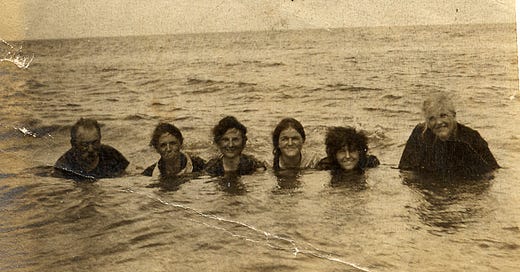




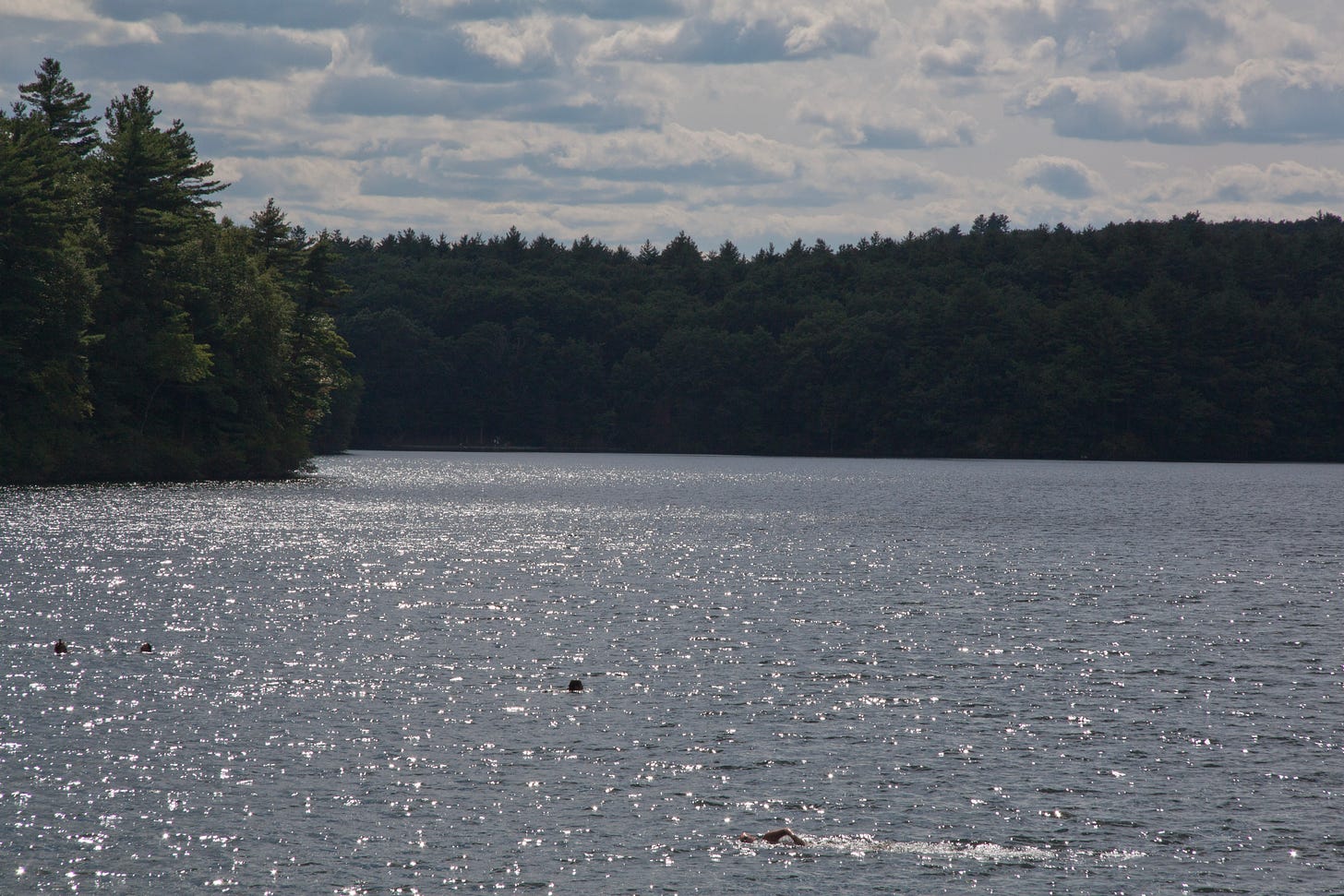
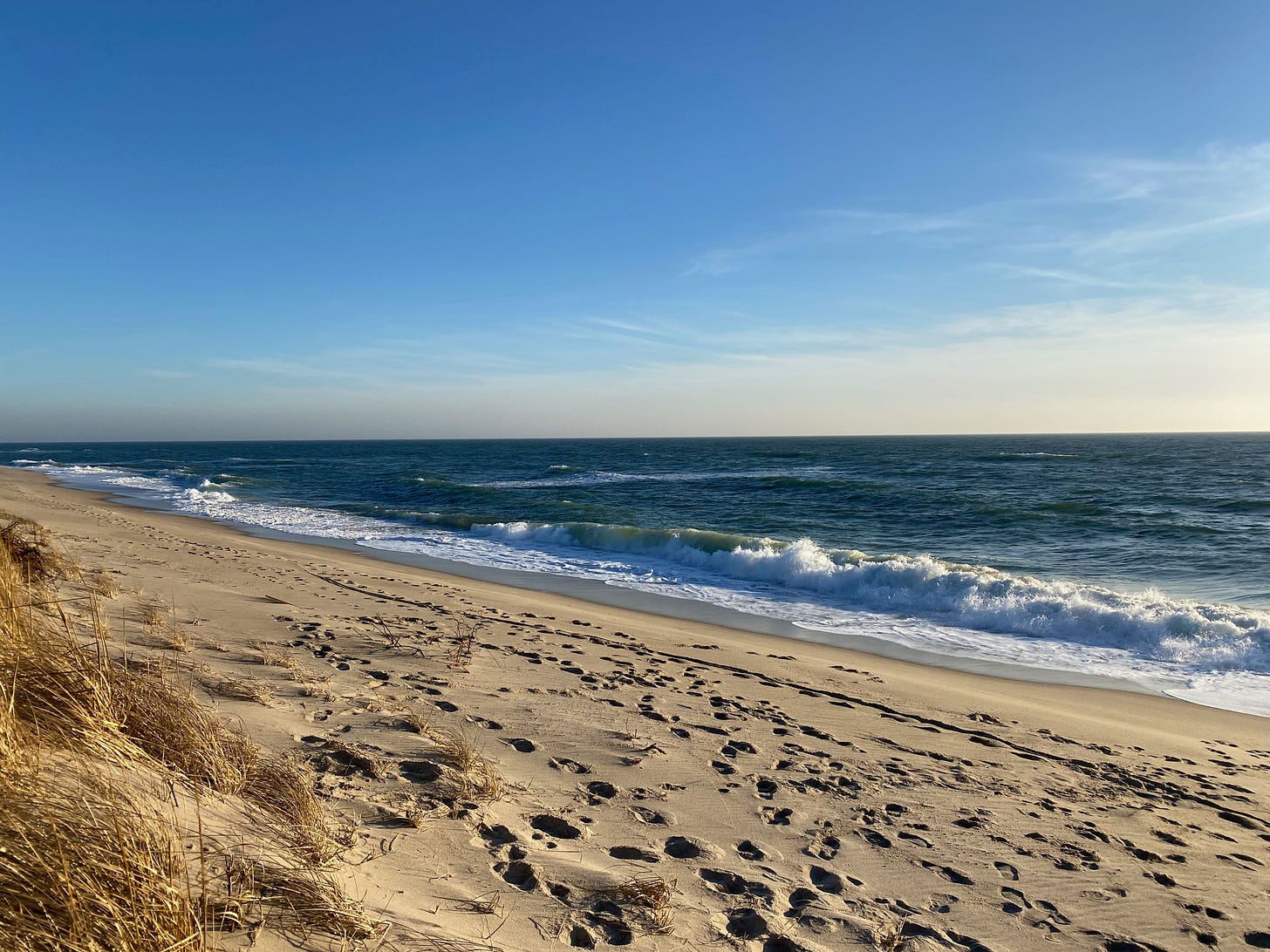
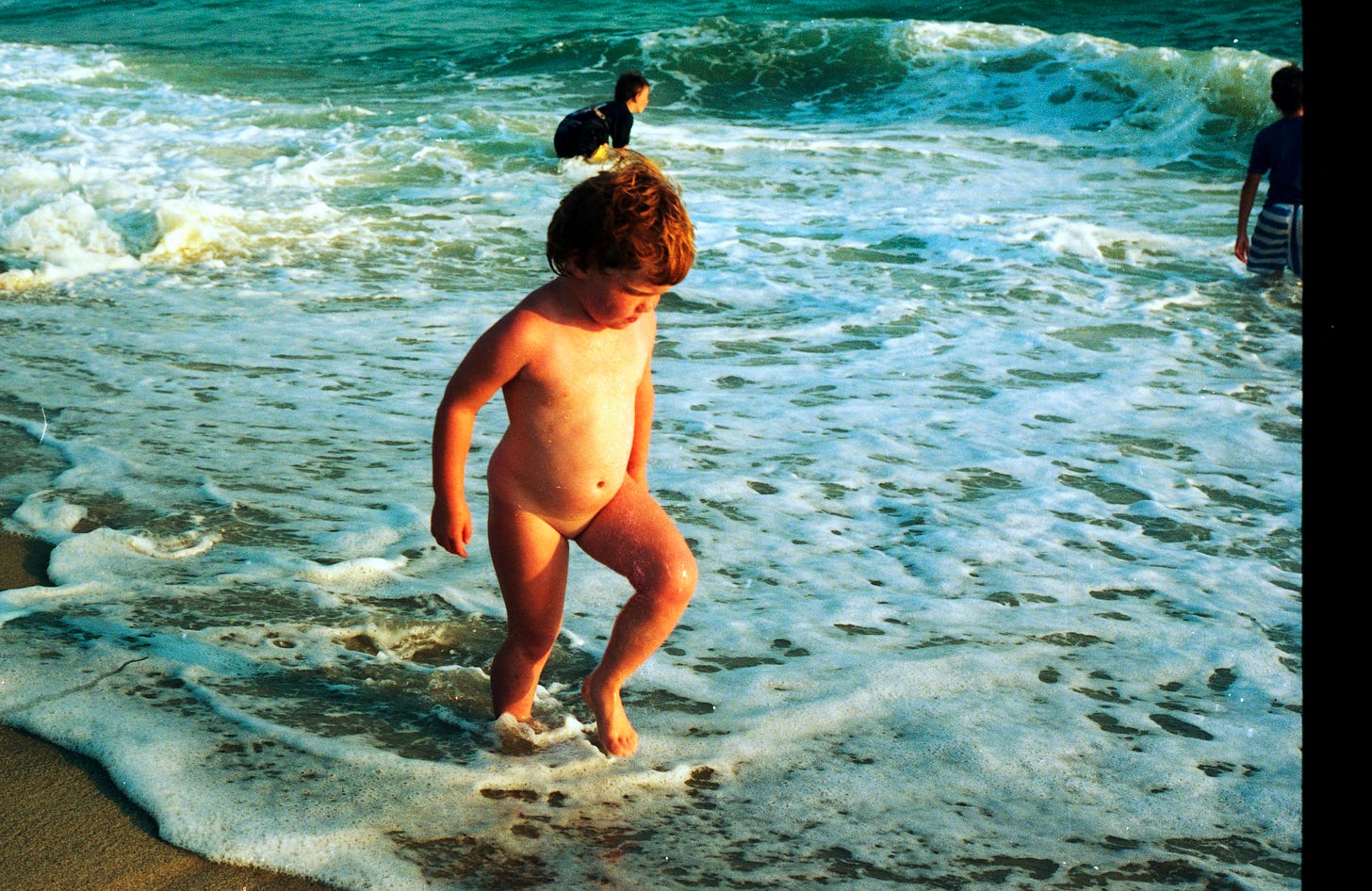
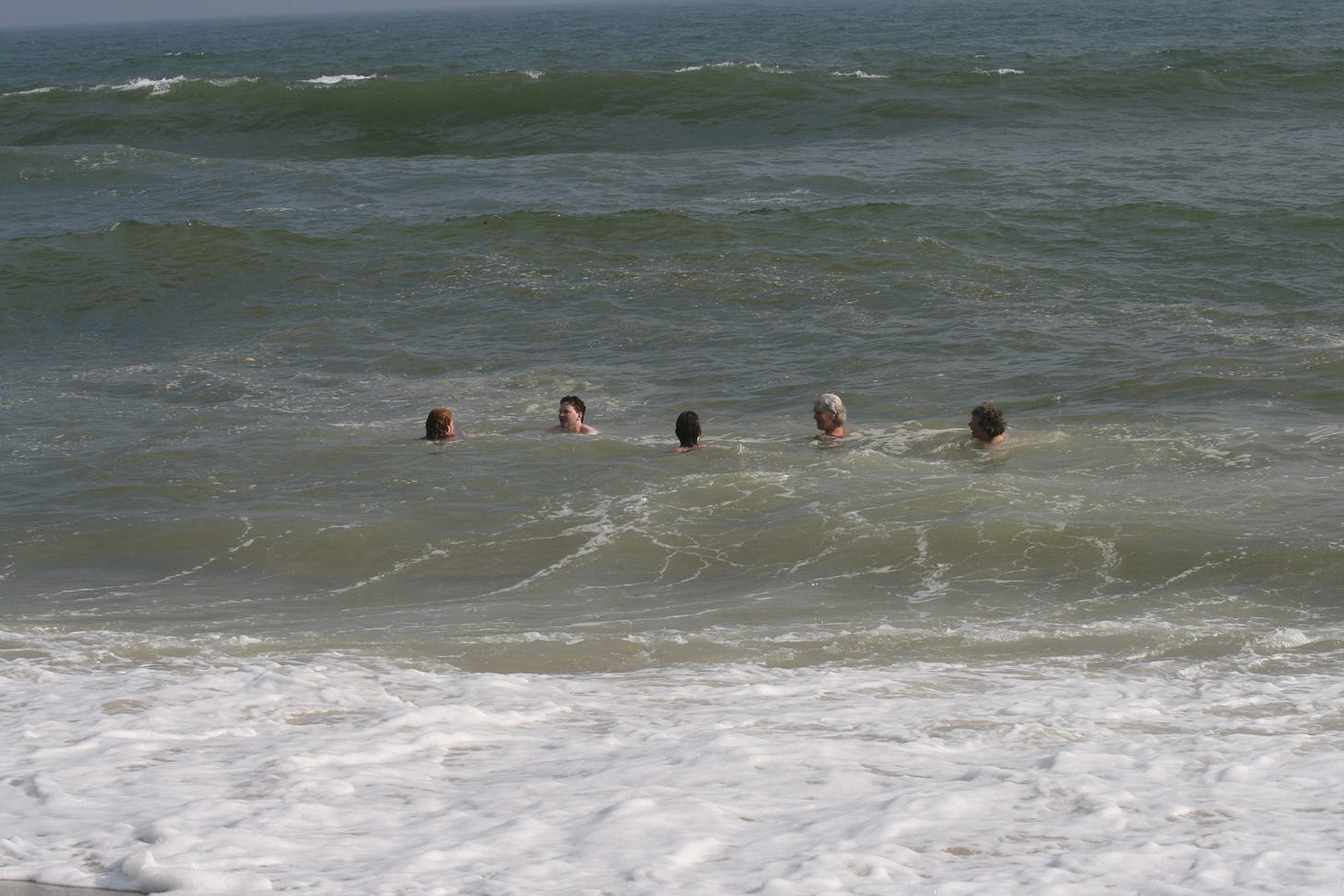
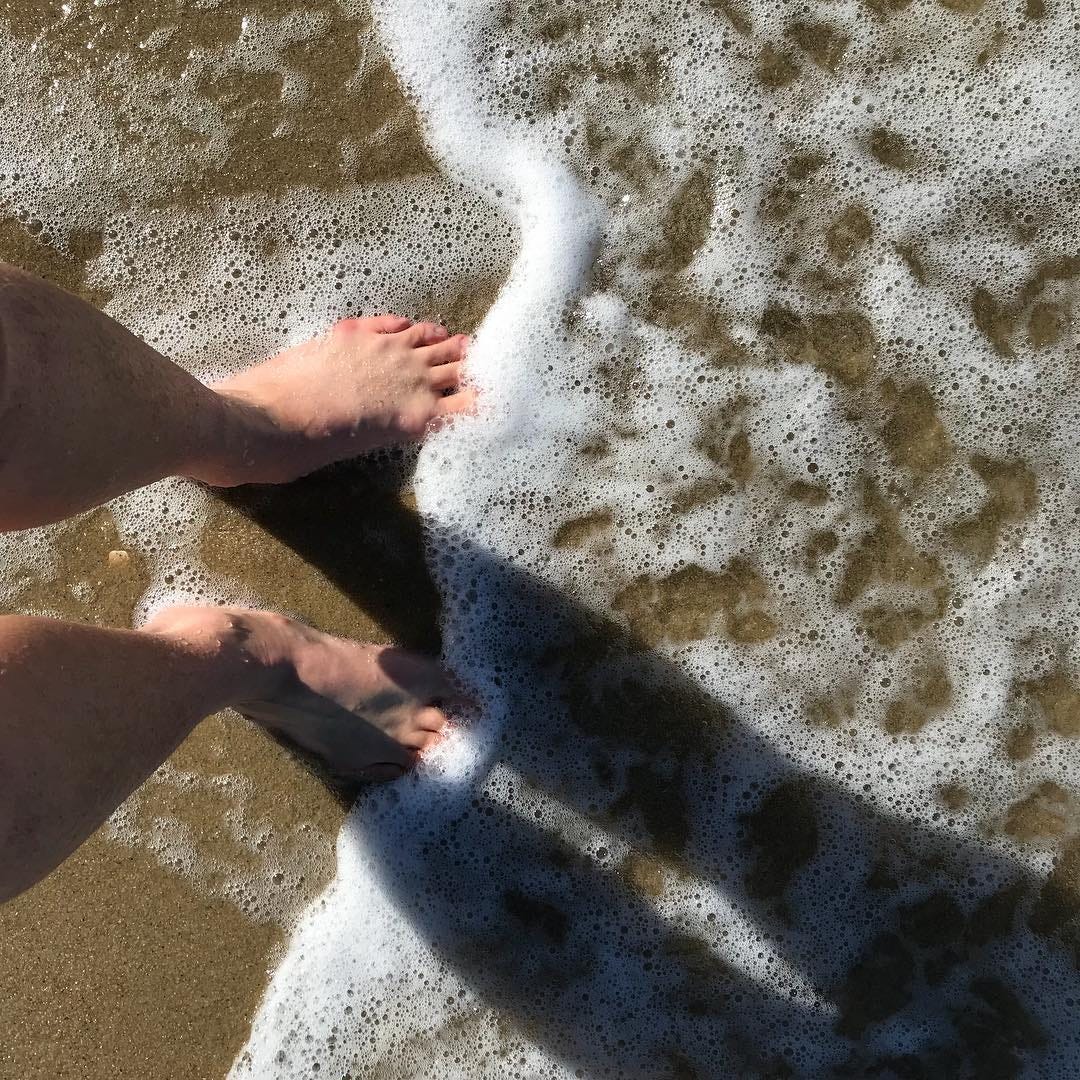
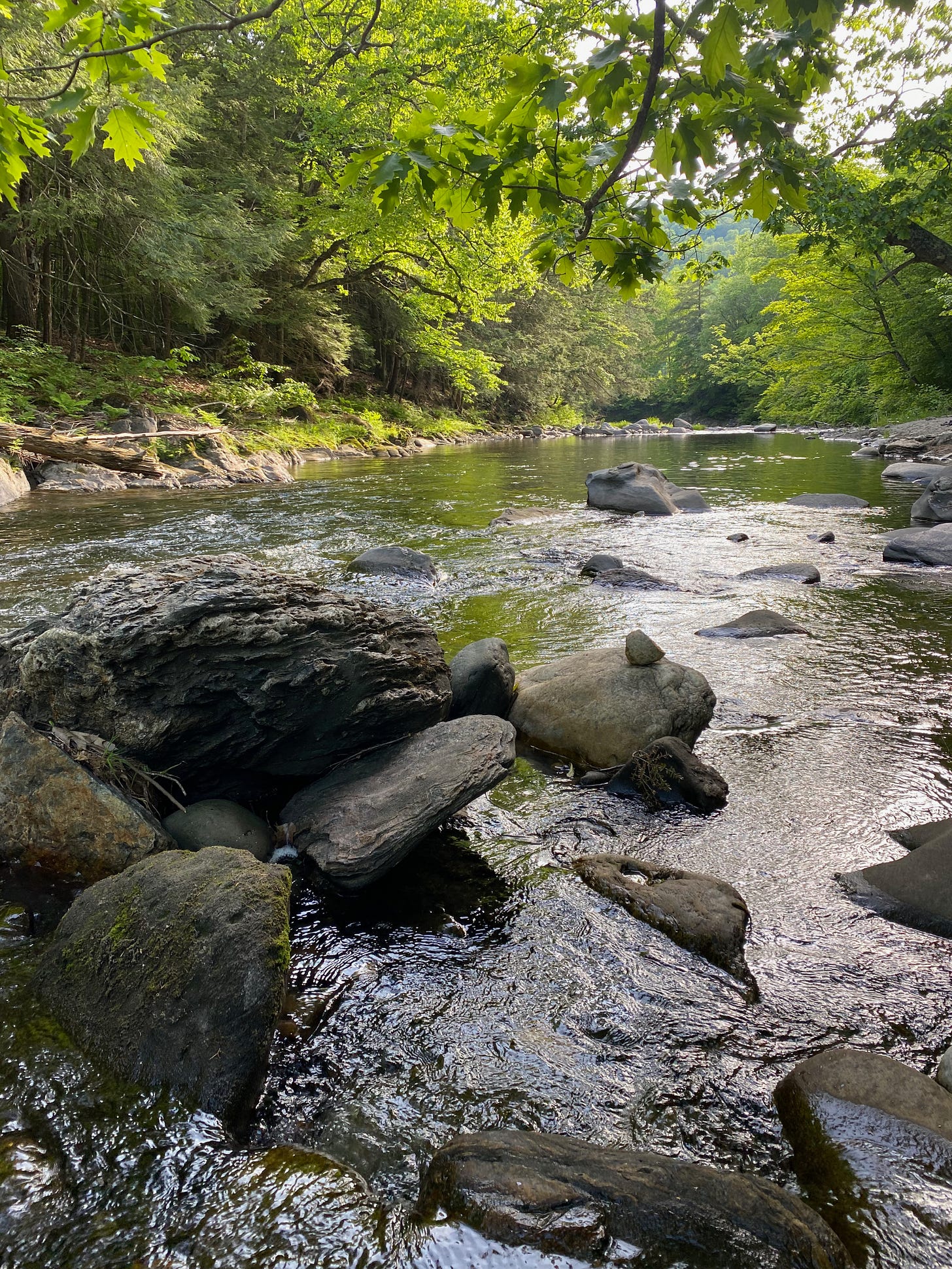
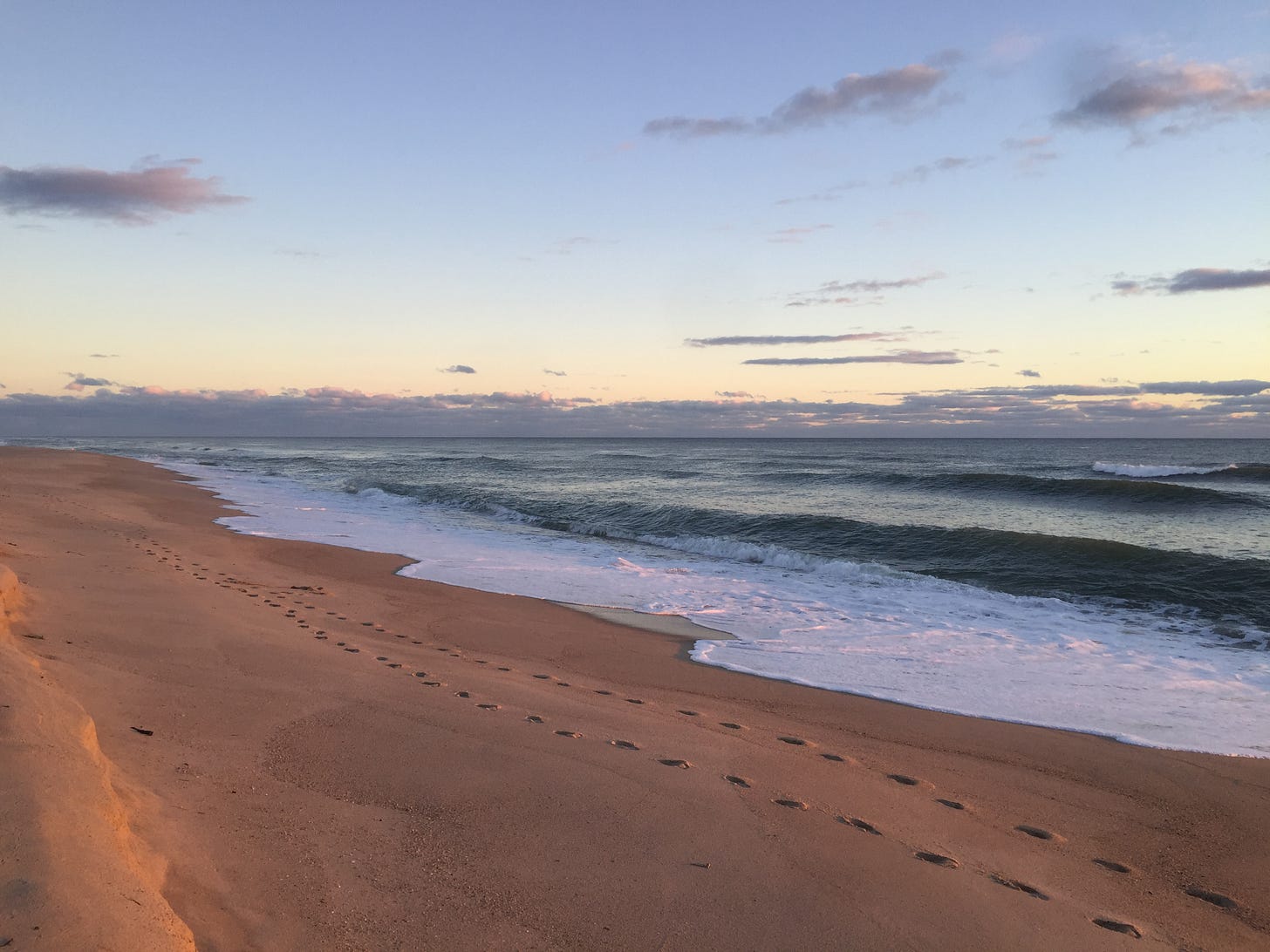
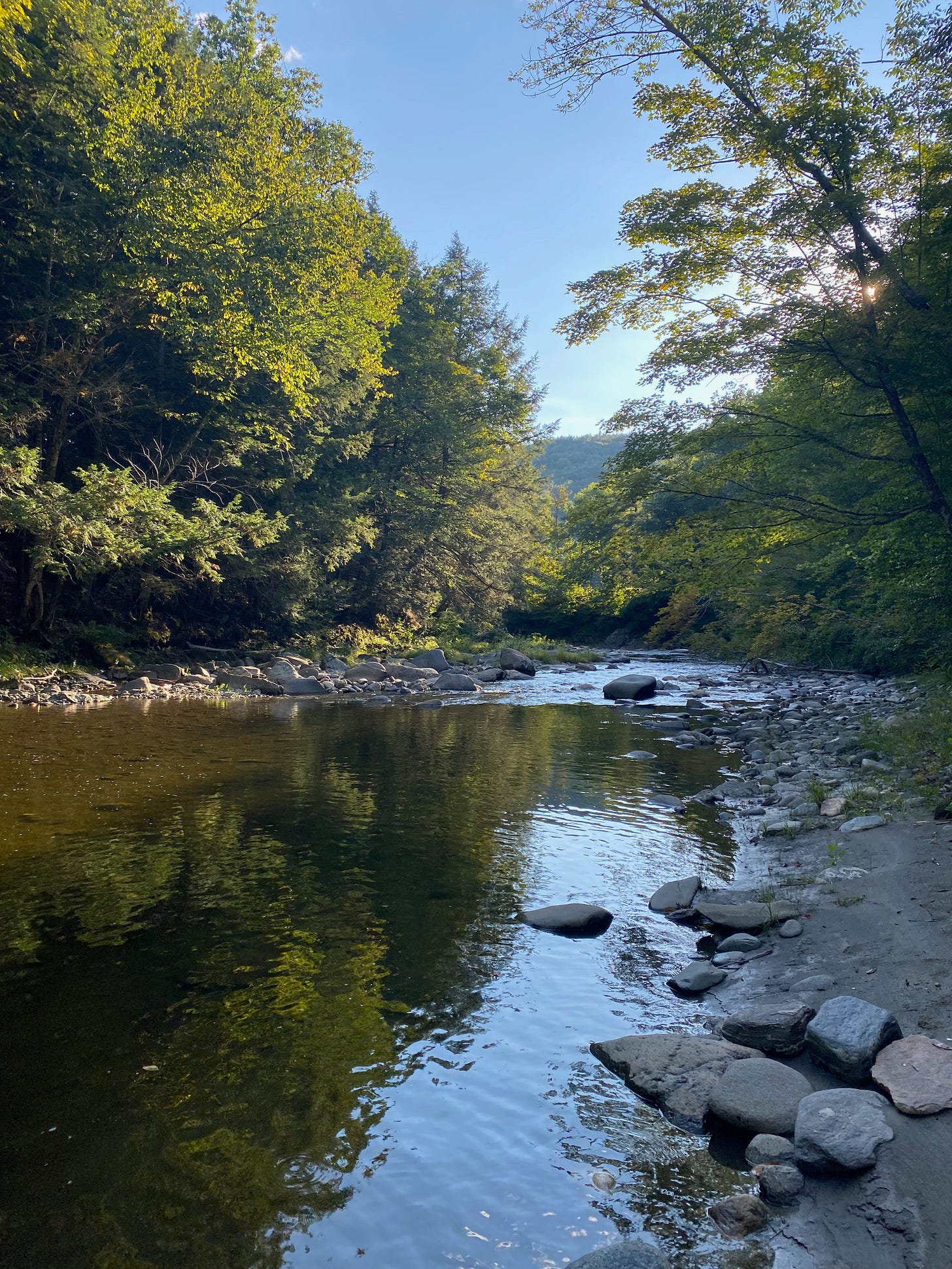
I really enjoyed reading this as I've swum at some of these places although Red Barn scares me. I swim and itch as a result of skin disorders but I love swimming in these places too.
I loved reading this essay and I am thinking a lot about different waters and which ones feel most like home. Ive swum in many strange YMCA's and hotel pools on my travels(from a huge pool in China to a Jewish Community Center in Portland Oregon) and most of them were just pools until I felt the rhythm of swimming in my body. The surf at Red Barn does something extra special--in the past few years as I age Ive become addicted to it. Thanks so much for this and I loved the photos.